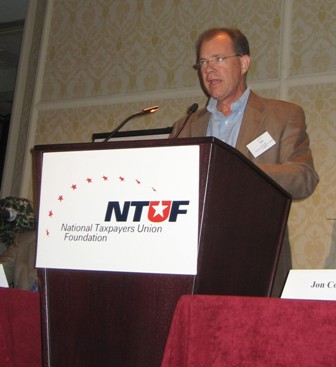Jon Coupal, President of the Howard Jarvis Taxpayers Association, addressed anti-tax advocates from around the country today at the National Taxpayer Union’s annual conference. The topic of Jon’s talk was "Finding Ways to Win" and he focused on HJTA’s leadership in defeating Proposition 88, the "parcel tax" on real property on the last statewide ballot in California. Jon gave some good advice to the crowd about how to successfully oppose a tax increase measure on a shoe-string budget.
 Jon explained that last time around there were four tax increase measures on the ballot, namely Proposition 86 (tobacco), Proposition 87 (oil), Proposition 88 (the parcel tax), and Proposition 89 (corporate tax). He said that the opposition campaigns for tobacco, oil, and corporate had built-in vested interests and knew they could fully fund their own opposition campaigns, but the parcel tax was different, as it was a flat regressive tax that would not make much of a dent in business budgets to motivate campaign giving. It was clear there was not a lot of campaign funding to work with. But the tax needed to be defeated on principle. In putting together a grass-roots campaign that involved good opposition research to cut-off support for the pro-tax measure, coalition-building and outreach to new ,unusual potential supporters (such as the American Resort and Development Association – whose condo owning members would be hurt by the tax), great use of "earned" media such as talk-radio, and a relatively small budget of $1.3 million for paid media, Coupal and HJTA were able to lead an opposition that garnered a whopping 76.9% of the vote, even exceeding the "no" vote margins achieved by each of the other three mega-million dollar professional campaigns for the "no" sides on the other propositions. On the paid media side, Coupal credited use of targeted radio, and extensive use of slate mail (30 million pieces in all!) as the reason Proposition 88 was defeated so handily. (I loved the credit he gave to slate mail.)
Jon explained that last time around there were four tax increase measures on the ballot, namely Proposition 86 (tobacco), Proposition 87 (oil), Proposition 88 (the parcel tax), and Proposition 89 (corporate tax). He said that the opposition campaigns for tobacco, oil, and corporate had built-in vested interests and knew they could fully fund their own opposition campaigns, but the parcel tax was different, as it was a flat regressive tax that would not make much of a dent in business budgets to motivate campaign giving. It was clear there was not a lot of campaign funding to work with. But the tax needed to be defeated on principle. In putting together a grass-roots campaign that involved good opposition research to cut-off support for the pro-tax measure, coalition-building and outreach to new ,unusual potential supporters (such as the American Resort and Development Association – whose condo owning members would be hurt by the tax), great use of "earned" media such as talk-radio, and a relatively small budget of $1.3 million for paid media, Coupal and HJTA were able to lead an opposition that garnered a whopping 76.9% of the vote, even exceeding the "no" vote margins achieved by each of the other three mega-million dollar professional campaigns for the "no" sides on the other propositions. On the paid media side, Coupal credited use of targeted radio, and extensive use of slate mail (30 million pieces in all!) as the reason Proposition 88 was defeated so handily. (I loved the credit he gave to slate mail.)
Part of the lesson of the experience, Coupal said, is especially that good legal research and opposition research can be very valuable, even if you know a budget will be tight, because it was through these forms of research he was able to identify his potential support sources for the campaign funds he was able to raise, and also to work to suppress the support of the proponents.
Looking forward, Jon gave a valuable insight into what is in store from HJTA on the 2008 ballot. He said he was preparing a new initiative on eminent domain in the aftermath of the defeat of Proposition 90, which HJTA supported on the last ballot, but did not write. Jon said his support group for this new anti-eminent domain initiative had gone through 28 drafts of a new law, to work out the types of kinks that flawed Prop. 90, and that work was now done and HJTA would be preparing to qualify the initiative for the June 2008 ballot.
Jon responded to an interesting comment about "liberal Republicans." A complaint came from the audience about how "liberal Republicans" are "constantly voting for tax increases" like the Democrats, and all the panelists were asked to describe "liberal Republicans" in their states, and their obstructionism. Jon responded that because of redistricting, Democrats tend to be "more liberal" and Republicans tend to be "more conservative" in the California Legislature, and that the biggest issue he observed here was about party discipline, and the need to keep the Republican caucus together, to increase clout for Republicans as a whole, especially because of the 2/3rds vote requirement on fiscal matters. Jon said in his experience, the Republicans that do end up voting "liberal" in the legislature usually are those who come out of local government and have perhaps been councilmen/women and Mayors.
Tonight NTU conferees will be treated to a roof-top reception at the Heritage Foundation with former Club for Growth executive Steve Moore. Speakers tomorrow include Senator Mike Gravel, Paul Jacob of U.S. Term Limits, Governor Jim Gilmore of Virginia, more panels, and a closing dinner with Cal Thomas.

